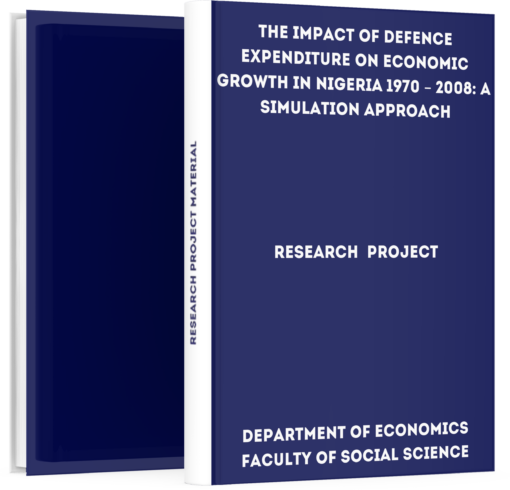The Impact of Defence Expenditure on Economic Growth in Nigeria 1970 – 2008: A Simulation Approach
₦3,000.00
If you are interested in getting this project material “The Impact of Defence Expenditure on Economic Growth in Nigeria 1970 – 2008: A Simulation Approach”, click on the DOWNLOAD BUTTON to make payment and the file will be delivered to your email immediately after confirmation.
Description
– The Impact of Defence Expenditure on Economic Growth in Nigeria 1970 – 2008: A Simulation Approach –
Download The Impact of Defence Expenditure on Economic Growth in Nigeria 1970 – 2008: A Simulation Approach. Students who are writing their projects can get this material to aid their research work.
Abstract
This study was undertaken to examine the existing link between defence outlays and economic growth in Nigeria with a view to recommending the appropriate expenditure reform to be embarked upon.
This is because, in Nigeria, like other developing nations the productiveness of defence expenditure has not been seriously considered. Some cuts in some components of public expenditure can result in unacceptable economic and social costs.
Therefore, a large-scale empirical analysis of the relationship between defence expenditure and economic growth is imperative. Available evidence from literature has shown that the impact of defence expenditure on economic growth is mixed or inconclusive.
But there was consensus that defence sector engulf large amount of economic resources in the presence of agitation for a reduction, thus implying that other sectors are stifle of the limited resources.
The rapid expansion of the public sector, in particular, defence sector, in the face of limited access to revenue generation has created fiscal deficits.
Defence expenditure is increasing owing to the changing nature of crisis, the need to modernize the military sector as well as the urge to provide a working and conducive environment for the growth of the Nigerian economy
Introduction
1.1 Background of the Study
Nigeria has continued to experience serious fiscal imbalance since early 1970. This has manifested in large scale public spending which always overshoot public revenues.
The fiscal crisis is considered unsustainable. Therefore, various fiscal measures have been used to address the problems. The first measure has been to generate more revenue to reduce fiscal deficits but there are political and economic challenges in increasing tax revenues.
The second measure is expenditure reduction to address fiscal deficits. In this respect many people have advocated reduction in defence expenditure without considering the growth implication of such important component of public expenditure.
Indeed, economic performance in Nigeria has not been impressive despite the large oil revenue. There are problems of inflation, low investment, high exchange rates of naira to dollars, debt overhang and unemployment to mention a few.
All these have been attributed to poor expenditure management and corruption. Musgrave and Musgrave (2005) highlighted three roles of public expenditure.
First, is the allocation function which is made to balance the provision of private and social goods. Second, the stabilization function concerns the attainment of full employment and stable prices. Income distribution is the focus of the third function.
At the end of World War II, economists began to apply economic theory to defence related issues with research focusing on the activities of cold war, super power, arms race, military alliances, terrorism and nuclear weapons. The end of the cold war witnessed several analyses on disarmament, conversion and peace dividend.
Yet, the World up till now remain a dangerous place with increasing regional and ethnic conflicts, threats from international terrorism, weapons of mass destruction and various forms of national crises
How to Download this Project Material
First, note that we are one of the best and most reliable online platforms because we don’t retain any of your personal information or data as regards making payments online.
PRICE: ₦3,500 ₦3,000 (Three Thousand Naira Only)
Make a bank deposit or mobile transfer of ₦2,000 only to the account given below;
Bank Name: UBA Account Number: 1022564031 Account Name: TMLT PRO SERVICES
After making the payment, CLICK HERE to send the following on WhatsApp;
- Depositor’s Name or Screenshot of Payment
- Name of the Past Question
- Active Email Address
or Call Us On +2348082284439 Once your details have been received and your payment confirmed by us, you will receive the past question in your email or WhatsApp within 5 Minutes.
Guarantee of Getting the Material
We understand that due to the high rate of fraud, many people are afraid of making purchases online but be rest assured that PastExamQuestions will deliver your material after payment.
Once your details have been received and your payment confirmed by us, you will receive the past question in your email or WhatsApp.
Give us Feedback
Have we been able to satisfy you? How well do you think the material will be helpful after having gone through it? Does the price worth the material?
Let’s hear from you! We recommend that our customers give feedback at the end of every transaction to enable us to serve better. You can do this by clicking the review button on this page.
Where is the review button? >> Just scroll up to where you see reviews





Reviews
There are no reviews yet.